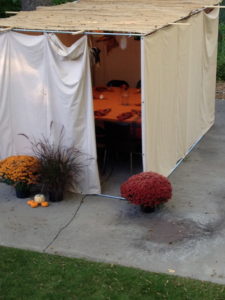If you have ever uttered the words “Christmas envy” or feared that your kids would suffer from that condition, then I have the holiday for you. Forget about Hanukkah! Well, don’t forget it. You should keep enjoying Hanukkah. But don’t bother comparing it to Christmas since our holiday has never come out on top and never will. The good news? The real action happens at Sukkot.
Let me be clear: I don’t think we need a “Jewish Christmas.” Personally, I’m comfortable with our people’s simple Hanukkah and the myriad of other holidays, including Shabbat every week. However, if people are going to persist in mentioning the existence of such a thing as a “Jewish Christmas,” I maintain that we can do better than Hanukkah.
Hanukkah is a dark war story, you guys. Yes, it’s “the festival of lights” with a jolly ending in that the Maccabees won and there are still Jews on Earth. Hey, it was a win for all of monotheism. But Hanukkah is not a dancing around bonanza type of festival. It’s a quiet holiday with little to do (commandment wise) other than lighting the menorah. We gather with family and sometimes with friends and eat latkes and exchange gifts (thanks to Christmas), but Hanukkah lacks the underlying rambunctious joy of Sukkot with its commandment for meals in the Sukkah all week long with guests and feasts and nothing but merriment.
Are there gifts during the week of Sukkot? Well, no. However, as I already mentioned there are gifts during Hanukkah, yet that hasn’t stopped kids and adults from looking longingly over at Christmas with its big pretty tree to decorate, egg nog to sip, and warm cozy sweaters and socks to don. The Christmas envy issues are not about gifts then, which explains why despite our use of eight nights of presents to beef up Hanukkah, the event still feels like the loser in the “Happy Holidays” package every December.
Back to happiness.
Sukkot is called zman simchateinu, meaning the time of our joy. We are celebrating how God protected us for 40 years in the desert. As the holiday occurs during the harvest time, we are also acknowledging all that we have from food, to shelter, to everything else, including the fact that we have made it through another Day of Atonement and have apparently received a good judgment. We use the symbols of the Four Species (including the lulav and the etrog), with Kabbalistic meaning that are too deep to go into right now. (For that we have Google, or better, a good teacher.)
When we spend time in the Sukkah eating with friends and family we are reminded that the people we share our lives with matter more than the size of our homes, the make of our cars, and the value of every other status symbol we own or desire. All of our possessions are as temporary as the walls of the Sukkah. The holiday helps us regain the perspective that it’s better to focus on what we have rather than what we want. I like the theme of gratitude, and I’m glad to have the reminder every year.
But perhaps most pertinent to “the Christmas spirit” is this: For Sukkot we have something significant to decorate!
You know all that blue tinsel and those blue and white lights and all the blue and white versions of Christmas decorations that they sell at many Targets for Hanukkah in cities with a sizable Jewish population starting in November? Sukkot is a great time to use that stuff! I realize it’s too late for anyone without the materials for a Sukkah to throw one together now, but it’s something to keep in mind for next year. And it doesn’t matter if you didn’t have a Sukkah growing up. (I certainly did not.) They’re not too hard to put together, and you can even buy a kit on the internet. Perhaps decorate with a different theme every year. Blue and white next year. Exotic fruits and vegetables the next year. Disco theme the year after that. Deciding how to decorate the Sukkah and eating meals there with family and friends is a fun, warm, and positive Jewish memory your kids will have forever.
Is Sukkot exactly the same as Christmas? Of course not. I never said it was a perfect analogy. The main point is that if something about that particular holiday makes you or your kids feel like you’re missing out, then you truly can capture some of that feeling and far more by connecting to one of the most joyful and spiritual holidays on the Jewish roster. And if you don’t like the sound of Sukkot, come back in early March and we’ll chat about Purim. Now excuse me, I have some grape-shaped not-Christmas lights to untangle and hang.
Happy Sukkot!




1 comment